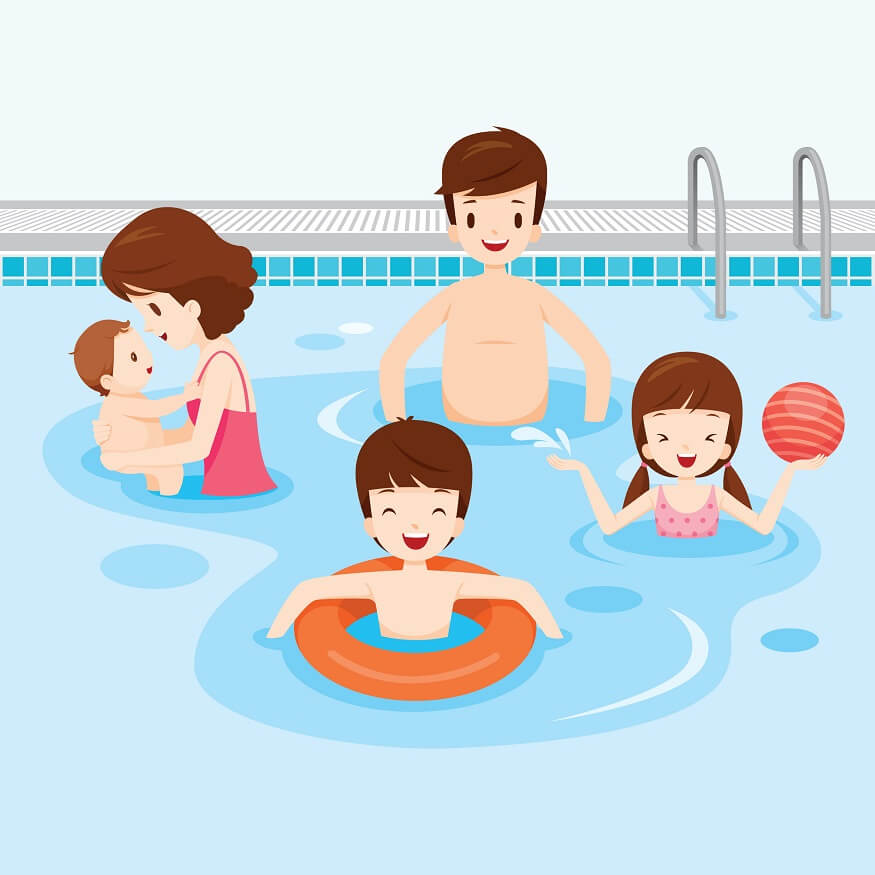Swimming is an essential life skill that should be learned by everyone. It is an opportunity for children to get to know the environment, to be introduced to swimming, and to be helped in their progress.
It has always been known that children participating in early swimming school had a profound advantage over other children, but until 2013, our beliefs were never substantiated by research. Parents frequently consider the benefits and drawbacks of different sports for their kids based on factors like cost, safety and so on. Although it is true that being able to swim is a need rather than a luxury and this is not the only benefit of swimming training for children.
These beliefs are still surprising to many parents. Here are a few reasons why swimming classes must be enrolled for children when they are young:
A child’s physical activity is kept active by swimming.
We all know that when children engage in sports, they become stronger and more coordinated, and that’s certainly the case for younger children. Swimming is particularly unique because every muscle group is activated by it and yet it has a very low impact.
It has been shown by research that children who participate in early swimming lessons were, on average, over 7 months ahead of monitor achievement.
Intellectual Development is helped by swimming school.
Most people think that when their kids play sports, only their physical skills get better but it turns out that’s not the only area of improved growth. Studies show that kids who take swimming lessons are “anywhere from six to fifteen months ahead of the normal population when it comes to cognitive skills, Problem-solving in mathematics, counting language and following instructions.”
Water safety is taught through swimming classes
By making sure how to stay safe in the water, children can be saved from the risk of drowning. American kids who take swimming classes are much safer in water, especially those who are 1 to 4 years old. Swimming strokes, as well as fundamental water safety skills including floating and treading water, are taught to children in organised swim lessons in a secure setting. Concentration in activities such as:
● Being able to float for 60 seconds in the water.
● Being able to turn in a circle and locate an exit.
● Swimming for at least 24 yards before exiting the water.
● Pulling themselves out of the water without using a ladder.
● Jumping into the water until fully submerged and able to return to the surface.
Children should also be coached in common-sense safe behaviours including walking instead of running when near water, only swimming when an adult is supervising, and being aware of weather and environmental conditions. As too many unnecessary accidents and deaths have been seen, water safety is at the top of our list for children. It was reported by the CDC that “about one in five people who die from drowning are children 14 and younger.”
Strength is built and fitness is maintained by swimming lessons.
Gross motor skills and basic coordination can be helped by learning a swim stroke, and the activity of swimming can help a child build all-around muscle strength in the arms and legs. It puts less stress on joints yet improves aerobic health.
Also Read: How to prepare your child for sports season
Social development and confidence are promoted by swimming classes.
During this time of uncertainty, a safe environment for responsible socialisation can be provided by a group swimming school. Social skills such as observing classmates and learning to wait their turn, as well as swimming abilities, are learned while following the rules of acceptable social distance. Socialisation for their water activities is also learned by children because they begin to understand the difference between acceptable behaviour and rough play that might affect someone else. Activities such as swim teams are continued by children who really enjoy swimming, and enduring friendships are developed in the process.
Lifelong skills are built through swimming lessons.
It is much simpler to learn to swim for children than it is for adults. Parents will be more able to enjoy time spent near the water if they know their child has great swimming abilities. For children, it is truly a rewarding feeling to master a skill that will stay with them for life.
Parent-child bonding is improved.
Even if you have played the swimming instructor for a while to teach them some basics and they have made some progress, there is nothing better than a swimming school appropriate for their age and level to bond with you.
However, it should be noted that a child can learn to swim 25 metres independently in only ten 30-minute sessions by an experienced swimming instructor. Aqua kids’ swimming sessions are also offered by certain pools. These sessions aim to familiarise kids with water and let them progress with others of the same age in this environment. Reassuring them, encouraging them, and getting them to have confidence in themselves is the key to teaching children how to swim.
Things should not be rushed, they should be listened to, allowed to have fun in the water, and given advice.
Social interaction is taught by swimming.
A lot of social interaction is experienced in a swimming school by your child regardless of whether private or group swimming lessons are taken. Even when private lessons are taken, the swimming coach is interacted with, and positive social interaction is learned. Interacting with their peers is also learned in a group setting, and this helps boost their confidence and self-esteem.
Appetite is improved and better sleep is facilitated by swimming classes.
A common complaint from parents is that their child doesn’t eat or sleep well. The lack of physical activity is one of the main causes of this issue. Because swimming requires a lot of energy while learning to swim which makes them sleepy and hungry.
The ideal age to learn to swim.
There is no ideal age to learn how to swim, and it depends on each child. It is better to learn before the age of six, but in general, before the age of six, we talk more about familiarisation with water rather than learn to swim. From preschool, swimming classes are included in sport education programs.
A new environment is an opportunity for children to get to know. To introduce them to swimming is to help them progress.
Also Read: Essential swimming pool rules that all parents must know and teach their child
Conclusion
At Euroschool, we believe that going to a swimming school is very critical for kids’ safety, physical health, and overall development. Providing swimming education gives your child a lifelong ability that will enrich their lives while also ensuring their safety in and around water. Mastering new skills in the water and overcoming challenges helps children develop a sense of achievement and pride in their abilities. They gain confidence when they realise they have a valuable ability which not everyone has. The newfound confidence can extend beyond swimming and positively impact various areas of their lives.










